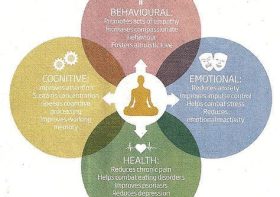The Power of Goal Setting in Fitness and Mental Health

Setting goals is a powerful tool that can transform your fitness and mental health journey. Whether you are looking to improve your physical strength, overcome mental barriers, or create a healthier lifestyle, establishing clear goals can provide you with direction, motivation, and a sense of accomplishment.
The Importance of Setting Goals
Goals act as a roadmap, guiding you towards the desired outcomes. Without well-defined goals, it can be challenging to stay focused and track your progress. Goal setting is essential in fitness and mental health for several reasons:
Provides clarity and direction: Setting specific goals gives you a clear purpose and helps you prioritize what is important.
Increases motivation: Goals provide a target to strive for, keeping you motivated throughout your journey.
Builds self-confidence: As you achieve your goals, your confidence grows, and you develop a stronger belief in yourself and your abilities.
Measures progress: Setting measurable goals allows you to track your progress and make necessary adjustments along the way.
Enhances focus and discipline: Having a goal encourages you to stay focused on your actions and develop discipline to make consistent efforts.
Setting SMART Goals
When it comes to goal setting, it is important to follow the SMART framework – Specific, Measurable, Attainable, Relevant, and Time-bound:
Specific: Clearly define your goal. Instead of saying, “I want to be fit,” make it specific by setting a goal like, “I want to run a 10k in six months.”
Measurable: Establish measurable parameters to track your progress. For example, “I want to lose 10 pounds in two months” is more measurable than simply aiming to “lose weight.”
Attainable: Set goals that are within reach and aligned with your current abilities and resources. Push yourself, but ensure your goals are realistic.
Relevant: Ensure your goals are meaningful and align with your overall fitness and mental health journey.
Time-bound: Set a deadline for achieving your goal. Having a timeline creates urgency and helps you stay focused.
The Role of Goal Setting in Fitness
The power of goal setting in fitness is undeniable. Whether you are a beginner starting your fitness journey or an experienced athlete looking to reach new heights, setting fitness goals can significantly impact your progress and results:
Improved Performance:
Setting specific fitness goals, such as increasing the amount of weight you can lift or improving your mile time, allows you to have measurable targets to work towards. With a clear goal in mind, you can structure your workouts and track your progress, leading to improved performance.
Motivation and Consistency:
Setting realistic and attainable goals keeps you motivated and focused on your fitness routine. With each milestone achieved, you gain a sense of accomplishment that keeps pushing you forward. Additionally, setting short-term goals can help you break down larger goals into more manageable steps, making them feel less daunting.
Health Benefits:
Goal-oriented fitness routines often lead to a healthier lifestyle overall. For example, setting a goal to eat more fruits and vegetables or to reduce your sugar intake can improve your overall well-being and contribute to long-term physical health.
The Role of Goal Setting in Mental Health
In addition to physical fitness, goal setting plays a crucial role in improving mental health. Setting mental health goals helps you focus on self-improvement and provides a sense of purpose and accomplishment. Here are some ways goal setting can positively impact your mental well-being:
Increased Self-Esteem:
Setting and achieving mental health goals, such as practicing daily mindfulness or volunteering, boosts your self-esteem. When you actively work towards improving your mental well-being, you feel a sense of empowerment and value within yourself.
Stress Reduction:
Setting goals related to stress management techniques, such as regular exercise, meditation, or journaling, can significantly reduce stress levels. Working towards these goals helps you establish healthy coping mechanisms and maintain a better mental state.
Improved Focus and Productivity:
Setting goals helps you prioritize and focus your energy on tasks that contribute to your mental health. By setting clear objectives, you can avoid distractions and increase productivity in various aspects of your life.
Incorporating Goal Setting into Your Fitness and Mental Health Journey
Now that you understand the power of goal setting, here are some tips to incorporate it into your fitness and mental health journey:
Reflect on your current state: Assess where you stand currently and identify areas of improvement or specific fitness and mental health goals you want to achieve.
Create a plan: Break down your goals into smaller, actionable steps. This helps you create a roadmap for success.
Set realistic targets: While it’s important to aim high, set goals that are attainable and within reach. Unrealistic expectations can lead to frustration and disappointment.
Track your progress: Regularly monitor your progress to stay motivated and make adjustments as necessary. Keep a journal, use fitness apps, or seek professional guidance.
Celebrate milestones: When you achieve a goal, celebrate your success! This helps reinforce positive behavior and encourages you to keep going.
Stay committed and adapt: Consistency is key. Stay committed to your goals, but be flexible enough to adapt to unforeseen circumstances or changing priorities.
Remember, goal setting is a continuous process. As you achieve one goal, set new ones to keep evolving and challenging yourself.
In conclusion, goal setting in fitness and mental health is a powerful tool that provides direction, motivation, and a sense of accomplishment. By following the SMART framework and incorporating goal setting into your routines, you can make significant progress towards improving your physical and mental well-being. So, set those goals, stay focused, and watch yourself transform!


